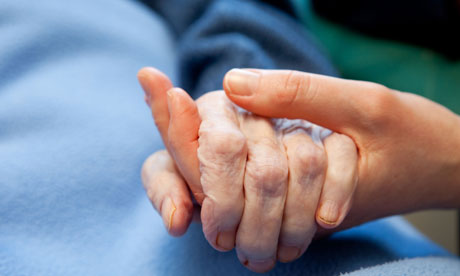Late last week the California state legislature subverted their own rules by pushing through “The End of Life Option Act” during a special legislative session after the bill had failed to clear the proper committees earlier this summer. Currently the measure is awaiting further action from Gov. Jerry Brown who has not indicated whether he will sign it into law. This act would legalize physician assisted suicide in the largest state in the union and provide political momentum for similar measures in other states. Although its supporters claim that laws like this one are necessary to protect the freedom and human dignity of people who are dying, the truth is that physician-assisted suicide ultimately narrows the scope of our freedom, puts vulnerable populations at risk, and leaves us with an impoverished understanding of human dignity. Governor Brown should veto this legislation.
“No one should have to suffer excruciating pain”
We often hear “No one should have to suffer excruciating pain” put forward as a basis for supporting the legalization of physician-assisted suicide. It’s a shrewd but deceptive political move. Of course, everyone agrees that no one should needlessly have to suffer excruciating pain – ever. However, that does not mean that we should allow doctors to help their patients kill themselves. According to statistics from the state of Oregon, less than a quarter of patients seeking PAS cited inadequate pain control as their reason for seeking to end their lives (it ranks sixth out of seven “end of life concerns” tracked by the state). If someone is in excruciating pain, the solution is better pain management and better access to palliative care experts who have specialized training to alleviate that pain. The chief cause of inadequate pain relief at the end of life is poor pain management by providers, not a lack of pain management solutions. Providing better palliative training in medical and nursing schools and improving access to and coverage for interdisciplinary palliative care teams are better ways to address concerns about pain at the end of life than PAS. In the very rare instances where pain is unmanageable, palliative sedation remains an effective alternative. “Legalize PAS or condemn the dying to suffer excruciating pain” is a false choice.
“No one should have to suffer shame in their dying.”
We must recognize that suffering at the end of life is not caused exclusively by physical pain. Often the suffering is existential. What is at the root of that sort of suffering? What is it that is so awful and undignified that proponents of PAS think it is morally legitimate to choose death rather than suffer such a fate? Usually, this existential suffering is caused by an imminent loss of autonomy (the #1 reason cited in Oregon). What people fear is becoming dependent upon the care of others.
We live in a society that holds up a very individualistic understanding of autonomy as a supreme value. Anything that compromises our autonomy is perceived to be a threat to our worth as persons – to our very selves. We spend our lives defining ourselves by what we can do. Our sense of identity is so connected with our abilities and accomplishments that we may feel that our lives are not worth living in their absence. With enough money, power, and good fortune, we may be able go through almost the entirety of our adult lives maintaining the illusion that we are fully self-reliant, autonomous creatures. PAS offers the prospect of extending that illusion right up to our final breath. A law that gives us the right to demand that a physician help us die at the moment we choose provides some semblance of control, but it can never provide what we really want, which is to have our health restored so that we can live again as we once did. It is an empty form of control based upon a very incomplete understanding of what it means to be human.
If people feel shame at the end of life because they find it difficult to receive care from the people that they love or from healthcare professionals, the proper response is to combat the false ideologies and the stigmas that reinforce that shame. The proper response is to help people learn to accept care and to see that it does not undermine their dignity. It is worth remembering that all of us entered this world fully dependent upon others for life, and often we must leave this world the same way. To depend upon others is not an indignity; it is part of being human.
Consequences of the Freedom to Choose Death
Legalizing PAS might expand freedom and choices for some people who already have considerable power at their disposal, but it will put vulnerable populations at risk and make their dying more difficult.
Good end-of-life care can be expensive and complicated to deliver effectively. It usually requires a considerable investment of time and money by family members. In the present reality of American healthcare, it is not unreasonable for people who cannot afford to hire private-pay caregivers to fear their dying would impose a burden on their spouse or children who might be working one or two jobs that do not provide paid family leave. For people in this situation, PAS does not expand freedom. In fact, introducing the option of PAS might suggest that it makes more sense simply to end things quietly and quickly rather than put the patient and family through the difficulties of an extended dying process. As Ira Byock has argued, approving PAS sends a message that it makes more sense for the medical system to kill people than to do the hard work it must do to make end-of-life care more effective and humane.
The medical ethicist Daniel Callahan has argued that the legalization and practice of PAS change the social dynamics that support a patient’s ability to choose not to take his or her own life. He wrote in The Troubled Dream of Life:
By assuming that the relief of suffering is a goal important enough to legitimate killing as a way of achieving it, we corrupt the idea of such relief as a social goal and duty. We cease helping to bear one another’s suffering, but eliminate altogether the person who suffers. We thereby jeopardize both the future of self-determination and the kind of community that furthers its members’ capacity to bear one another’s suffering. Why bear what can be eliminated altogether? For the sake of controlling the conditions of death, we would introduce a fundamental change in the conditions of living a life. In the name of controlling our mortality, we would enter a claim to change the nature of human relationships.
The regular practice of legalized PAS would reduce our ability to die well by changing the shape of our social expectations and our relationships. Expansion of PAS would undermine the development of systems of care that make dying well without suicide possible.
If we are serious about helping people to die well in the United States, we should work hard to ensure that all health care coverage includes the provision of comprehensive care for individuals who are nearing the end of life, and seek to implement the other recommendations found in the report, Dying in America, from the Institute of Medicine of the National Academies. PAS is not part of that solution. Please contact Governor Brown right now, and tell him that he should veto this legislation.




As is so often the case, this is a question of who should decide. Should the dying person decide? Should the family decide? Should the doctor decide? Should strangers who know nothing at all about the details of a particular situation decide?
My mom died of Parkinsons Disease in a very long, very slow, very painful horrific process that took about 15 years to complete. She had great medical care, and an amazingly helpful partner. But, there’s only so much anyone can do. Please reflect on that reality if you can.
SUFFERING: I was disappointed to see you rudely dismiss concerns about suffering with the quip that such concerns are a “shrewd but deceptive political move”. On the other hand, such a comment suggests you probably have not yet experienced what you’re speaking to, and I’m sincerely happy for that. May it ever be so.
SHAME: How odd it is for you to attempt to manage from a great distance the shame of millions of people you’ve never met and know nothing about. Ok, um, well, mea culpa, I say a lot of crazy stuff too, we can be brothers in that.
CONSEQUENCES: Your last point is your best argument, I suggest putting your focus there. I would agree that a great deal of care needs to be invested to ensure it is the dying person’s wishes which are respected, and not family members who may be inconvenienced by their illness, and not those entirely outside the situation who wish to insert themselves.
SOLUTION: The solution here would seem to be a living will which each of us completes before we are sick, which specifies in as much detail as possible what our wishes are. The completion of such a document can be seen as the price we must pay if we wish to later access doctor assisted suicide. If we don’t pay that price, then perhaps we have not shown sufficient seriousness to earn that right.
WHO DECIDES? God gave you a human body. And He gave you free will. Until God reclaims His property, your body belongs to you, by Design, throughout what I hope is a long healthy life, and in your dying too.
NOT THESE PEOPLE: You body doesn’t belong to me. Or your mate. Or your family. Or any doctor. It doesn’t belong to the state. Or any religion. Or your neighbors. And I’m sure you’ll agree your body doesn’t belong to strangers on the Internet either.